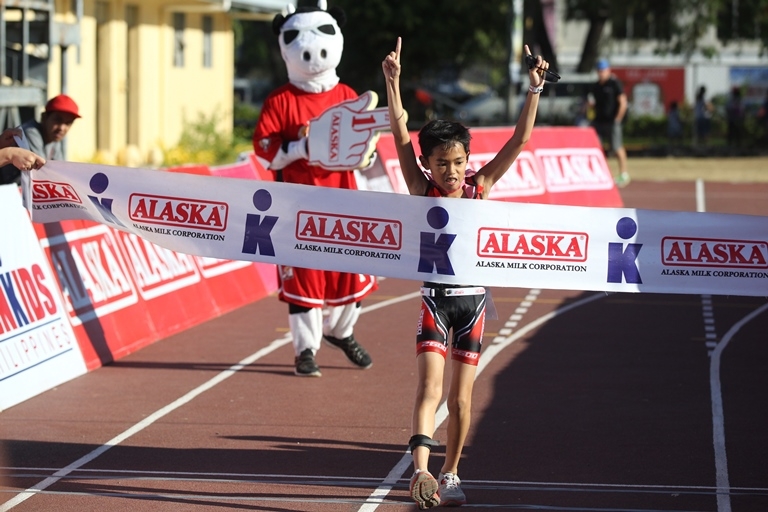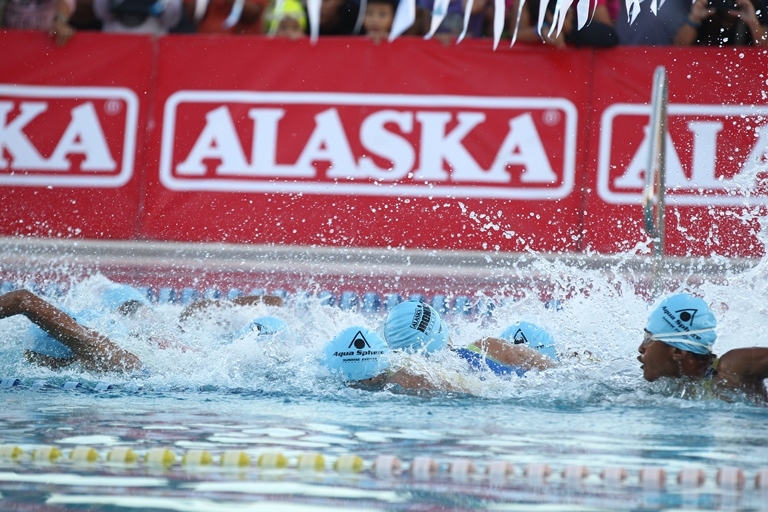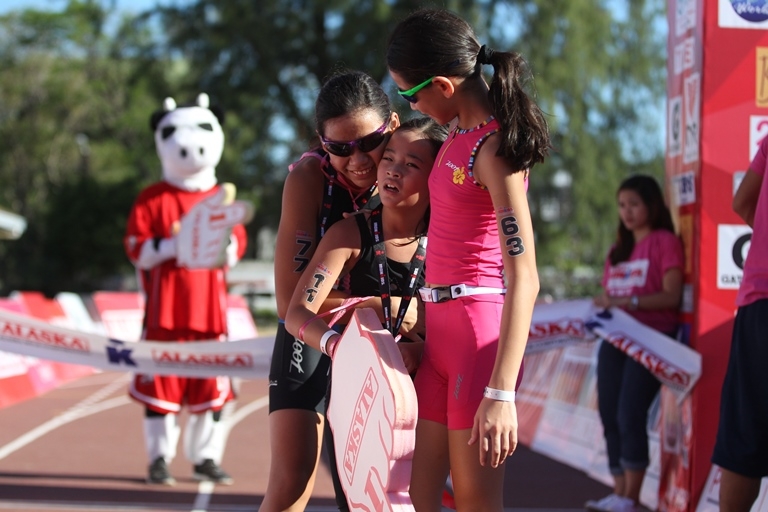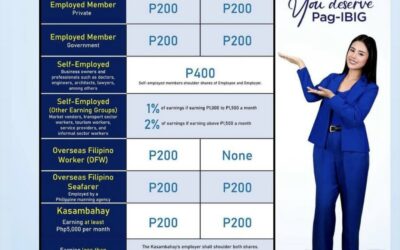By EPI FABONAN III

Which is why it comes as no surprise that obesity is one of the most prevalent nutritional problems of Filipino children in recent years. According to the seventh National Nutrition Survey conducted in 2008 by the Food and Nutrition Research Institute (FNRI), about 2 out of 10 Filipino children are overweight. If not addressed, obesity can lead to serious heart diseases or diabetes at a young age, leading to even more serious health, economic, and social problems in adulthood.
Better than ever

This year’s iteration of Alaska IronKids will be having four events—two aquathlons and two triathlons. Last Saturday, March 7, over 120 children who signed up for the first Alaska IronKids triathlon event of the year convened at the Subic Bay Free Port Zone (SBFZ) Sports Complex in Subic, Zambales.
The triathlon is divided into three categories: the Race Category, for young athletes who are vying for time and distinction; the Relay Category, for young athletes with particular concentrations in biking, swimming, or running; and the Play Category, for children who want to join for the fun of the experience and the fitness it builds. This category, which was first introduced in 2014, is geared towards promoting outdoor play and physical activity among children.
A family that races together

The Borlain sisters, Tara, Samantha, and Franchezka, all raced in this leg of Alaska IronKids – proof that family does hand-in-hand with fitness and nutrition
One of the young triathletes present at the Subic leg is Jose Manuel Arao of Team Trikids Davao. It’s his fourth time joining Alaska IronKids, but this is his first time racing in Subic.
“Aside from getting ample sleep and the right diet, I would train for at least one hour in the morning and two hours in the afternoon. My coach has been doing a good job of helping me develop my triathlon skills in preparation for the race,” Jose Manuel says, adding that as much as possible, he completes all his assignments in school so he can still have time for family and friends, aside from training.
Jose Manuel was joined by his parents, Edward and Rayanne, who have been with him in every race. They explained how they helped in training their child: “When he first joined Alaska IronKids in Cebu, he was trying to lose weight. Now, he’s gone a long way through our support. We make sure he gets the right food including his milk and vitamins. As advised by his coach, he gets at least eight hours of sleep. We don’t let him train if he doesn’t have enough.”
As early as 5 a.m. Jose Manuel and his fellow athletes in the 11–12 and 13–14 wave were already at the poolside of the SBFZ Sports Complex. Their race was divided in three, with the 300-meter swim as the first leg, followed by a nine-kilometer bike along Rizal Highway and a two-kilometer run along SBFZ’s oval. Each leg of the race has different lengths per age group and category.
At gun start, Jose Manuel and his fellow Alaska IronKids participants rushed from one side of the pool up to the last lap of the swim race, as parents and guests hollered and cheered. The race was challenging, with each athlete trying to maintain speed and pace without falling off his bike or tripping mid-race. But all the pressure was replaced by fulfillment and relief once everybody crossed the finish line.
Throughout the Sports Complex, several booths made the event a truly family affair more than just a competition. Triathletes, parents, and guests enjoyed free Alaska Chocolate Powdered Milk Drink, games, and giveaways from different event sponsors.
Race results
In the boys’ 6–8 race, Dayshaun Ramos of 2600 Tri Team came in first with a time of 19:45, followed by Jabrielle Delizo and Reggeal Victoria. In the girls’ 6–8 race, Justicia Tan of Tri Clark Yellowcab emerged victorious with a time of 21:33; behind her were Franchezka Borlain and Caitlin Gaw.
Meanwhile, Mark Grist of Sabak Tri finished first in the boys’ 9–10 race, clocking in at 17:16, followed by Matthew Thomas Alumbres and Juan Miguel Tayag.
In the girls’ 9–10, Alison Noble of Bullshark Tri Team finished first at 18:45, with Patricia Tolentino and Ana Maria Mempin behind her.
Juan Francisco Baniqued of Trigear topped the boys’ 11–12 race at 33:56, with Jose Manuel Arao and Karl Rafael Pamakid closely behind him.
In the girls’ 11–12 race, the Borlain sisters—Tara and Samantha Borlain—dominated at first and second place, with a time of 34:08 and 34:38, respectively. Everly Janarie Macalalad finished third.
Finally, in the 13–14 race, Brent Valelo of Tri Clark Yellowcab and Nicole Danielle Eijansantos won in the boys’ and girls’ category, with each one finishing at 30:21 and 34:52. Sabino Czar Ivan Manglicmot and John Caleb Barlin finished second and third in the boys’ category, while Christine Levi Gaspar and Una Janus Sibayan, completed the girls’ race in second and third place.
‘The sport keeps us together’
If there is one team that’s totally triumphant in this race, it’s Team Borlain. For the first time, all three Borlain siblings competed, with the youngest, Franchezka, successfully completing her race. She finished second in the girls’ 6–8 category, but her sisters Tara and Samantha still rooted for her.
“This race is more fun because Chezka was able to join the race. We’ve been training together for the past weeks and today it paid off. We believe that if we go together as a family, we can be stronger and more successful. It’s the sport that keeps our family together,” says Tara and Samantha.
Even prouder is their father, Ringo, who has been around them from training to race day: “Seeing them having fun is first and foremost for me. With all of them winning in their respective races, it’s the best feeling a parent can have. It’s amazing how this race just kept our family together and made my children a lot healthier. Now they’re drinking more milk than before, like five to six glasses a day.”
‘There should be room for fun’
Like Franchezka, Jose Manuel also finished second in the boys’ 11–12 category, with a time of 34:20. He looked enlivened by his race experience: “The race is more organized and safer for the bikers this year because the roads are well-closed and the traffic is well-maintained. I definitely had more fun this time.”
His parents were equally joyful for his achievement. When asked about how the race has brought their family closer, they say: “We’re always together in each race. While the relationship has always been close even before Alaska IronKids, going to each race with him helped us understand his generation even more. We now know our son better because this race has enabled us to see him in his best and worst.”
“The children are already in a lot of pressure, training for about two to three months for a 30-minute race. Hence, while the race is very competitive, there should always be room for fun. It defeats the purpose if a child wins but forgets to have fun,” Mr. Arao, adds.
“To the families who are interested to join the sport, all they have to do is to support their children, trust the trainings, and make sure that they are on the right track in whatever he or she wants to do, not just in sports,” Mrs. Arao, says.
The Borlain and Arao families prove that competition or not, strong family ties always go hand-in-hand in having a well-balanced nutrition and a healthy, active lifestyle. And with sports events like Alaska IronKids, bringing the family together for fun, health, and nutrition, Filipino children can have a better chance of growing up fit, strong, and active members of society. Alaska invites more families to register their children for the next legs of the Alaska IronKids and be part of a truly positive experience for them.
To learn more about Alaska IronKids, visit their website at www.ironkidsphil.com. More information is also available at www.alaskamilk.com.ph. For live updates, follow @AlaskaSportshub on Twitter or search for tweets using the hashtag #AlaskaIronKids.

EVERYONE’S A WINNER. Alaska IronKids winners in the boys’ 11–12 category: Juan Francisco Baniqued (first place), Jose Manuel Arao (second place) and Karl Rafael Pamakid (third place). They received medals and prizes presented by (from left) Alaska E-Cow; IRONMAN world champions Craig Alexander, Tim Reed, and Josh Amberger; and Alaska Milk president Wilfred Uytengsu, Jr.



